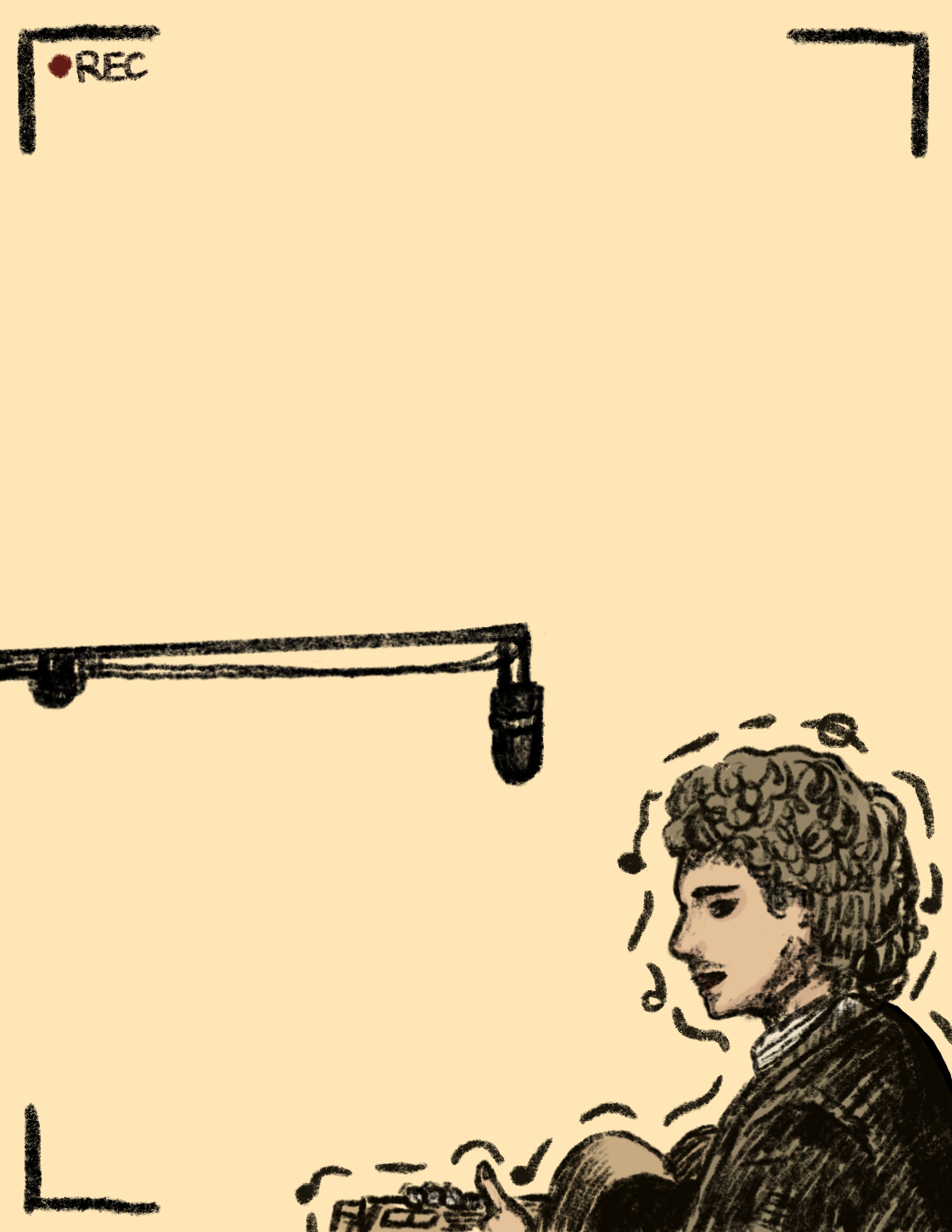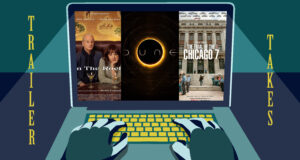It’s generally advised to approach relationships and careers with a teaspoon of caution. However, Bob Dylan (Timothée Chalamet) throws caution to the wind in Hollywood’s most recent biopic, A Complete Unknown (2024), which approaches stages of the star’s life with an effervescent, reverberating ambition.
Named after a line in one of Dylan’s most famous songs, “Like a Rolling Stone” (1965), the film quietly entered theaters on Christmas Day, with audiences initially watching either due to their love for Dylan or for Chalamet—hardly both. Yet, it seems that older and younger generations have found something new to bond over. While the film follows Dylan’s explosion into stardom in the 1960s, it is creating a mirrored phenomenon today: resurgence of Dylan-mania is at an all-time high, largely due to the visibility this film is garnering.
Panning out with Dylan arriving in New York City in 1961, the film starts slow, introducing key characters one shot at a time. Chalamet plays a coy, unknown Dylan who meets his hero Woody Guthrie (Scott McNairy), a legend in American folk music. The blend of music and plot creates a beautiful scene with Chalamet’s rendition of Dylan’s musicality—a surprisingly impressive one at that. His grit and passion truly shine in his vocal aptitude and ability to mimic Dylan’s slurring tone of speech, speaking to the five years he spent preparing for the role. Chalamet had picked up the guitar for one of his more iconic performances in Call Me By Your Name (2017), but has since put much effort into fine-tuning his singing prowess and playing the harmonica—both of which shine in his covers of “The Times They Are A-Changin’” (1965) and “Blowin’ in the Wind” (1963).
One understated moment of the film is its portrayal of the Cuban Missile Crisis in 1962: a box television playing presidential speeches and warnings in black and white underscores the crescendoing anxiety of those in Greenwich Village seeking comfort in the face of imminent death. Dylan’s winding, yet unyielding, “Masters of War” ultimately breaks the panic, culminating in quite the cinematographic progression when Joan Baez (Monica Barbaro) falls into his bed. They wake the next morning to alerts of safety, though Dylan’s relationship with Baez, as well as with his girlfriend, Sylvie Russo (Elle Fanning), have both completely changed.
Much like Chalamet’s portrayal of Dylan, Barbaro’s depiction of Baez is equally stunning, with a stellar introduction onstage at Gerde’s Folk City, where she delivered a bone-chilling rendition of “The House of the Rising Sun.” Assertive and confident in her ability as a musician, Barbaro illustrated Baez as someone who understands what she fights for: a woman with determination and conviction. Although Dylan’s affair with Baez had a little touch of Hollywood flair—in that it perhaps was exaggerated—Barbaro paired well with Chalamet to present the apprehensive and tumultuous nature of their relationship, from tense interactions on stage to awkward and hurtful lingerings in hotel rooms.
Despite the actors’ captivating embodiments of Baez and Dylan, there was still something left to be desired from their relationship by the end of the film, when a simple frame depicts Baez watching him leave the folk festival after tearing apart the world’s expectations with songs from his controversial new album, Highway 61 Revisited (1965). It’s not quite the satisfying end to a torrid affair the audience might have wanted—although, perhaps it’s more authentic.
Another key relationship of Dylan’s is the familial one he shares with Pete Seeger (Edward Norton). There as a mentor and calm, guiding force, Seeger offers genuine comfort to the audience. His character’s role is complemented by Guthrie, who serves as a way to show Dylan’s massive and intense growth as an artist, as Dylan returns now and then to sing his new songs to the old, hospitalized folk singer. Dylan and Seeger’s relationship, however, builds until it blasts apart, when Seeger’s deep rejection of traditional rock collides with how Dylan’s career trajectory was veering away from folk. But this collapse of their friendship was a little flat. Despite Norton’s unwavering attempt to demonstrate Seeger’s disapproval, it missed some of the bare, raw emotion that usually accompanies such a divisive crack in beliefs.
Building on the film’s strong performances, supporting actress Fanning shone as Dylan’s jilted lover, Russo. Her performance highlighted how Dylan wore his fame; as he fought to make himself known, she was slowly left behind to bleed into the background. Unable to bear Dylan’s unmistakable chemistry with Baez, Russo wishes him goodbye for the last time, quoting Bette Davis’s iconic line from Now, Voyager (1942): “Don’t ask for the moon. We have the stars.”
Apart from the movie’s extraordinary characterizations, A Complete Unknown treats advocacy and social justice with a sense of wishy-washiness, alternating between subtle and glaringly obvious features. While Dylan’s, Baez’s, and Seeger’s involvement in civil rights and other social change movements is present—such as in the opening court case indicting Seeger on ten counts of contempt of Congress and Dylan’s performance introduced by MLK Jr.—it is most certainly not a large focus. It would have been more compelling to see their motivations to perform, rather than assigning this as a background narrative element.
All in all, the tracklist and preparation each actor put into the film were astounding. As far as the story itself, it was a little bland, lacking some of the vivaciousness Dylan is known for. Some parts felt over-romanticized, and some were glorified in the name of making a movie, rather than accurately depicting his life. But the film was still two hours and 20 minutes of pure talent—not quite a rolling stone, but sensational nonetheless.







